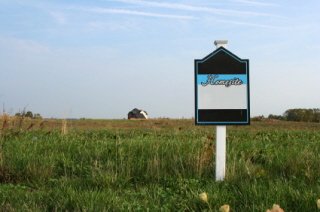Vacant Land Financing - How to Finance Vacant Land and What to Consider
Vacant land financing may be difficult to find when you start looking to secure vacant land loans. I will give you a few things to
consider when you're learning how to buy vacant land.
 The rationale is simple for lenders. Approving a loan for vacant land is a bit more risky.
The rationale is simple for lenders. Approving a loan for vacant land is a bit more risky.
Look at it from the banker's perspective. Since the collateral of the loan is raw land, (land not being used at that moment), if approved you
might leave at any moment. This would put the responsibility of the land squarely at the doorstep of the financer. You will be put through a
number of tests when you are looking to qualify for a loan, for this reason.
When you are looking for vacant land loans, know that vacant land financing is much more of a local bank arena than the big national banks. Local banks have a better feel for your area and are much more likely to grant loans to finance vacant land.
Looking For Vacant Land Financing - Start with Land Analysis?
Let's take a quick peek at how an appraiser would view the parcel of land you have chosen for your home building project.
An appraiser would start analysis with:
Legal Descriptions of the land - To identify individual parcels, appraisers use legal descriptions, surveys, and other descriptive
information usually found in public records at the county courthouse.
Title Information - Before an appraiser would set foot on-site for an inspection, they would research current owner information such and
deeds and trust documents. Additional support information can be found in land data banks and assessor maps.
Zoning and Land Use - This informs owners in the county exactly what type of properties can be built (residential, commercial, or
industrial properties). Zoning requirement control things such as the height of buildings, the size of buildings, Building setbacks, Plan lines
for future street widening, and open space requirements just to name a few. Land use restrictions will let you know if you can build the dream
house you want on a particular lot.
Assessment and Tax Information - the records of the tax office can uncover details about the assessed value, the annual tax burden of the
land, and how the county assesses property. Not all jurisdictions and states tax property the same. One county might assess property at 100% of
market value, while another county might assess property at 25% of market value.
Physical Characteristics of Land - An appraiser must describe and interpret how the characteristics of the land influence its value. These characteristics include site size, utilities, topography, accessibility, the environment surrounding the parcel.
Ok, now I know what you're thinking.......
How can I do this research?
The major thing you need to research as a potential owner of a new parcel is the zoning and land use restrictions. The first thing you should do
is visit your county's planning department. When there, request to look at your county's long term comprehensive land use plan. This will tell
you what's going to happen around the land for the next 10, 20, or 30 years.
 Your next step is to find out the zoning code of the land. You need to know if the house you are planning to build is permissible on that
particular lot. If the lot is in a subdivision ask to see the plat maps and subdivision restrictions.
Your next step is to find out the zoning code of the land. You need to know if the house you are planning to build is permissible on that
particular lot. If the lot is in a subdivision ask to see the plat maps and subdivision restrictions.
The plat maps will uncover restrictions such as easements, private roads, utilities, land boundary lines, and whether the land has county water access. If the land doesn't have county water access, you will have to consider the expense of installing different types of septic systems.
What Are the Bank's Qualification Criteria?
Local banks will decide whether to lend you money based on the qualification criteria set up by each lender. However, no matter what bank, there are certain things your financer will always ask. Think about these things below when you're buying vacant land. Having an idea about what will be considered is the best way to start when finding vacant land financing!
- Your ability to repay the loan - this is of course the most obvious thing that bankers look for when they are approving or denying a
loan to you. How do they judge this? Well, they look at things like your credit history, your tax returns, collateral assets you own, and if you
are building your personal residence as opposed to a speculative investment. This will include both your personal accounts as well as your
corporate accounts, if you own a company.
If the bank judges your repayment abilities positively, they will let you finance vacant land. The reverse is also true of course. It is a good idea to update your accounts and keep all financial documents handy. Having all this information ready will make it that much easier for you to secure vacant land financing.
- What is the land worth? - Your lender will of course look into the value of the property you are buying. This will depend on the purpose for which you want to use the land. The lender will also want to know the appraisal value and the purchase price of the land.
- Collateral value - this is another consideration you will face when you are looking to acquire a real estate land loan. Your bank
will typically offer you a loan to value ratio of 60-80 percent. So, you should expect to pay around 20 to 40 percent as down payment for a loan.
The amount you pay as down payment will depend on things such as the location of the land. Do you have other investments that will be considered as collateral for the land? A word of caution though. There is a high level of risk involved in buying vacant land, so you should talk to an advisor before you enter into such a proposition.
Vacant Land Financing - Some Other Points to Consider
- Consider the amount you have to pay as down payment. If your land is high risk and your repayment capacities limited, be prepared to pay more in down payments.
- Vacant land loans also have a typical maturity period of 10-15 years. You could consider using a home equity loan to get some tax benefits! (caution - read below)
- Consider whether equity against your home is worth it. If not, your credit union or local banks are the best places to look for a land loan. You can also talk to the mortgage brokers in your area so that you get the best bargain.
- Even the interest expense on a real estate land loan may get you valuable tax deductions. Make sure you talk to your tax advisor about this before you go for the loan.
What If My Bank Does Not Finance Vacant Land?
If the local banks in your area are not willing to finance vacant land, you have one of the following options:
- Look for a mortgage broker who will help you look for vacant land financing
- Pay for it yourself
- You can also apply for government land grants , however you will only be granted this money if your property is beneficial to the public
- You can also bid on land from government land auctions to find cheaper options
- You can of course find private loans through your family members, other money lenders or individuals with a high net worth
- You can make a down payment and have the seller hold the mortgage. This is known as seller financing. The seller must own the land outright or be willing to negotiate special financing arrangements with you
Vacant land financing may be difficult to find. When you start looking to secure vacant land loans you're learning the process of how to buy vacant land. Hopefully this page gave you some options to think and act upon!
You Might Also Like:
Home Design Floor PlansHome Design Floor Plans |
Green Home DesignsGreen Home Design |
Boat Home PlansBoat Houses |












